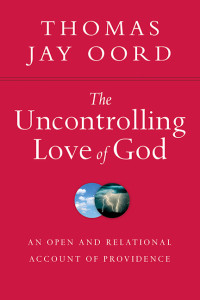More (Unconvincing) Reasons Some Accept Creatio Ex Nihilo
In a previous post, I listed three reasons some Christians think God created our universe from nothing. I was unconvinced by those reasons. Here are three more reasons some people embrace creatio ex nihilo. Although some are interesting, I also find these reasons unconvincing.
Science Requires the Traditional View
There are strong scientific reasons to believe our universe is expanding. This expansion serves as a key element in believing the universe began with a big bang roughly 15 billion years ago. In fact, big bang theory dominates contemporary cosmology as the best theory for how our universe began. Consequently, those acquainted with big bang theory and who believe God is Creator sometimes say science supports creatio ex nihilo.
Big bang theory does not account for what may have come before our universe. We still might wonder, “Out of what did the big bang come?” And “Do we have good reasons to wonder if something existed before the big bang?”
At present, science has no way to investigate what occurred before the big bang. But recent research suggests that the universe contains more dark matter than what would have come from a big bang. This research prompts us to ask about the origin of dark matter and whether it has connections to what existed before our universe.
Accounting for dark matter and the big bang pushes us toward metaphysical speculation. Of course, science and theology always include metaphysics. But the issues of dark matter, in addition to biblical and theological issues, should encourage us to take multiverses, cyclical universes, and other cosmological theories seriously. In sum, science does not confirm creation from nothing.
To Deny Creatio Ex Nihilo is to Affirm that Matter Predates God
Some Christians accept creatio ex nihilo, because to say God created from something sounds like God did not create all things. If God used materials that pre-existed our universe, they ask, from where did these materials come? Christians cannot claim God created all things, visible or invisible, if God started with stuff not first created by God.
I think this is a strong argument. I also believe God creates all things. But we can believe God creates all things and also believe that God created the “stuff” that existed before our universe. In other words, God can be Creator of all and not have created our universe from absolutely nothing. We’ll explore this possibility in more detail later.
Closely related to the problem of “pre-existing stuff” is the worry that denying creatio ex nihilo would require believing the universe is eternal. There is nothing explicitly in Genesis that rejects the possibility of an eternal universe. But many want to believe only God exists everlastingly.
My alternative to creation from nothing does not say our universe is eternal. Only God exists everlastingly. But my proposal also says God everlastingly creates in relation to creation. I’ll explain how these statements can both be true. But here I simply say I think God creates all things, and the world is not eternal.
God Is or Could Be All-Controlling
In the social media poll I mentioned earlier, two groups of people said the belief that God is all-powerful motivates some Christians to affirm creation from nothing. This is not surprise, because creating from nothing seems to require amazing power!
The first group in the poll supports creatio ex nihilo. To them, God’s creating from nothing is an example of God’s omnipotence or sovereignty. God’s immense power can make something out of absolutely nothing, they say. The belief that God can control creatures or creation fits nicely with their view that God creates from nothing.
The second group of people reject creatio ex nihilo. They do so in part because the theory supports the traditional view of God’s omnipotence. For a number of reasons, they find the traditional view of omnipotence or divine sovereignty unbelievable.
The traditional view of God’s power seems to make the problem of evil unsolvable. If an omnipotent God can create something from nothing, this God must be able to control others to prevent evil. There is a direct link, in other words, between the problem of evil and creation from nothing.
I share this worry. I reject the traditional view of God’s power that says God either can or does control others. I believe God is almighty, but I don’t think God ever controls others. I have explained this belief in some detail in my book, The Uncontrolling Love of God. If you want to learn how God can be almighty but not controlling, I suggest you read it.
As I see it, we should think about our Creator in a way that doesn’t make God morally responsible for failing to prevent genuine evil. We should affirm God’s creating as motivated and carried out in love not as implying God has controlling power. A major reason to reject the creation from nothing theory, in other words, is that this view implies that God does not love consistently enough to prevent evil.
Conclusion
These are all important reasons some have accepted the theory that God created our universe from absolutely nothing. But I find none of them finally convincing.
I’ll offer one more essay that lists yet three more reasons some accept creatio ex nihilo. These reasons and my response are part of the book I’m writing on creation. I plan to offer a new theory of initial creation in that book.
Thomas Jay Oord

Comments
Perhaps humans attempting to understand the origin of the universe is about as perplexing as carpenter ants trying to explain Netflix? I know that humans are (supposedly) more intelligent than rocks and weasels, but that does not mean we have the intelligence capacity to grasp how the foundation of the universe was formed.
Einstein said, “Concerning matter, we have been all wrong. What we have called matter is energy, whose vibration has been so lowered as to be perceptible to the senses. There is no matter.”
This might shed light on John 17:21 when Jesus said, “I pray that they will all be one, just as you and I are one–as you are in me, Father, and I am in you. And may they be in us so that the world will believe you sent me.”
Perhaps everything is one? God and the stuff he formed our local universe out of is one. If the only thing that exists is energy…..wow, makes my head hurt to even contemplate this. Then again, I am barely smarter than most weasels….
I like your comments, Dart. I agree that we may not have the capacity to know these things, not even a tiny bit. But most Christians think making biblically/scientifically/philosophically/theologically-informed guesses — theories — is appropriate. After all, we are to love God with all we are, including our minds. So… I’m giving it my best shot! : )
You are certainly correct in that most Christians do make these “guesses” easily and then lock their minds shut. Growing up in many different Protestant churches in the South I have witnessed that all too well.
Now we have what appears to be an attempt to reconcile man’s wisdom (self illumination) and man’s “so called science”
to faith and belief in God. One is easily able to disect for personal comfort faith and science. Scientific Method will never be able to re-create the creation events. Yet good science research continues to support reasons to believe in a young earth. Bad science has caused the believers many problems trusting in man’s words and diminishing God’s word. The healthy
tension between these two so-called disciplines requires a maturity that even sophisticated credentialed PhDs fail to
demonstrate. Both science and theology are man’s tools created by man to serve man’s agendas. How easy is it to look into
the box for the point beyond which we can not see yet assign terminology to describe something that we know next to nothing about. In the beginning was the Word….not stuff. If we are so vain so as to think we actually create stuff, then use no
worldly stuff by creating your own medium (dirt). To assume that the four elements; C, H, O, N, were always present leaves
God with the reputation of an inventor or as we say today, a pharmacist.
The “pre-existing stuff” which God could still have created is something I haven’t thought about before. I would like to see this one in the book. (And the “just because it’s what I learned” theories of ex nihilo from the previous post are lame even if ex nihilo is true. No excuse for burying one’s head in the sand!)
It will DEFINITELY be in the book, David. It’s a key idea. Thanks for the comment!
This argument rests upon an assumption that cannot be true if God is, that assumption seems to me to state that some matter is coextensive with God in time. That our universe could have been manufactured by God from preexisting matter is possible, but at some point “T=0” for our universe and T=0 for all possible universes. Thus, at bottom God must be First Cause in the true sense of Aseity.